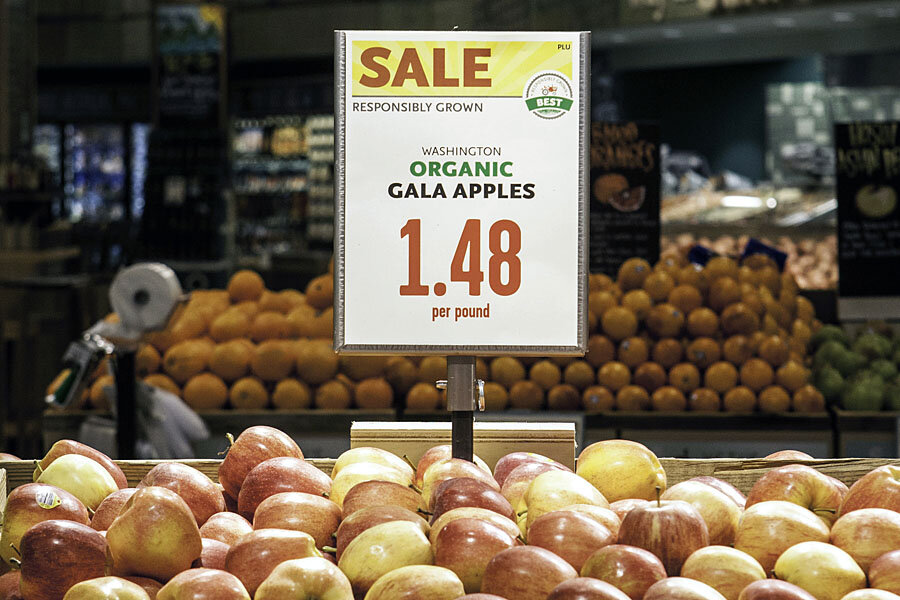Whole Foods to start ranking its produce. Squash beats spinach?
Loading...
Whole Foods plans to start rolling out a system that ranks fruits and vegetables as "good," ''better" or "best" based on the supplier's farming practices.
Most notably, the supermarket chain says its "responsibly grown" labeling system for produce and flowers will prohibit the use of several common pesticides. The rankings will also take into account factors such as water and energy use.
The program will start appearing in the nearly 400 Whole Foods stores in the U.S. and Canada starting Wednesday, with the rankings being noted on signs where prices are listed. Not all produce and flowers that Whole Foods sells will qualify.
“After three years of research and planning, Responsibly Grown is the result of our collaboration with suppliers, scientists and issue experts to continue our strong commitment to organic, while embracing additional important topics and growing practices in agriculture today,” said Matt Rogers, global produce coordinator at Whole Foods Market, in a press release. “We are excited to broaden the conversation to recognize additional growing practices and drive more transparency in the industry.” - See more at: http://media.wholefoodsmarket.com/news/responsibly-grown#sthash.MzjsImbq.dpuf
The standards were developed by Whole Foods and are not an official government designation.
Whole Foods is trying to draw a sharper distinction between itself and its competitors, in part by making shoppers feel more empowered about their purchasing decisions. The grocery chain already has ranking systems for meat and seafood, which takes into account animal welfare and sustainability standards, respectively.
Whole Foods, based in Austin, Texas, has nevertheless seen its sales growth slow as traditional supermarket chains and big-box retailers have muscled in on the market for organic and natural products. To hold onto customers, executives have said they plan to more clearly state what makes Whole Foods stores different.
Mr. Rogers said the "responsibly grown" program is major push toward eliminating the use of certain pesticides that studies have indicated can be harmful to farm workers and children born to mothers exposed to them.
Although organic standards prohibit a more comprehensive list of pesticides, he said the "responsibly grown" program could encourage non-organic producers to stop using some pesticides.
He also noted it's intended to address other factors people care about, such as water use.
The program shouldn't result in higher prices for shoppers, but Rogers said such labeling typically helps boost sales because people feel better about what they're buying.
Food industry experts applauded the move.
“I applaud the courage and conviction of Whole Foods Market, and its growers and suppliers, for taking decisive action on more than a dozen high-risk pesticides. The next generation of Americans will be the primary beneficiaries of this bold step,” according to Dr. Charles Benbrook, research professor and program leader for the Center for Sustainable Agriculture at Washington State University.
Kari Hamerschlag of Friends of the Earth, an environmental advocacy group, applauded Whole Foods for prohibiting a fairly comprehensive list of pesticides to qualify for its rankings. To achieve the "best" rating, however, she noted only four of the seven major pesticides shown to be harmful to bee populations were prohibited.
Information about what the rankings signify will be available online and in brochures in stores.
To achieve a "good" rating, Whole Foods says suppliers also have to take 16 steps to "protect the air, soil, water and human health." The steps vary in difficultly, however. For instance, the first is that the supplier meets regulations regarding matters such as irrigation.
Michele Simon, a public health lawyer and author of "Appetite for Profit: How the Food Industry Undermines Our Health and How to Fight Back," said private retailers can play an important role in pushing suppliers toward better practices. But she noted that such rankings by companies can also lead to consumer confusion if not done properly, especially if there isn't transparency behind how they're determined.
Whole Foods said suppliers will submit compliance information through an internal website. If the applications raise any red flags, the company may ask for more documentation or perform on-site audits. Whole Foods declined to provide a comprehensive list of additional steps suppliers would have to take to qualify for the "better" and "best" rankings.







